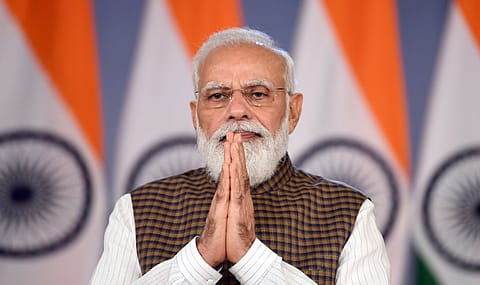Odisha gets ₹60,000 crore boost with new telecom, rail, and education projects
From telecom and railways to housing and semiconductors, projects span key growth sectors with welfare schemes for rural and tribal families.

Prime Minister Narendra Modi on Saturday inaugurated and laid the foundation stone for development projects worth over ₹60,000 crore in Jharsuguda, Odisha, spanning sectors such as telecom, railways, education, healthcare, housing, and skill development, according to a release from PIB.
“Our government at the Centre and the State is committed to accelerating the pace of development in Odisha,” Modi said at the event.
Telecom and connectivity push
A significant portion of the investment, around ₹37,000 crore, has gone into commissioning more than 97,500 mobile 4G towers built with indigenous technology, including over 92,600 sites by BSNL. These towers, many of them solar-powered, are expected to connect about 26,700 unserved villages, particularly in remote and left-wing extremism-affected areas, and benefit more than 20 lakh subscribers.
Marking the launch of BSNL’s indigenous 4G services, Modi said, “India has taken a significant step towards self-reliance. BSNL has successfully developed a fully indigenous 4G technology within India, placing the country among the top five globally with this capability.” He added that the new towers would also be equipped to support 5G.
The Prime Minister dedicated to the nation and laid foundation stones for several railway projects also, including the Sambalpur–Sarla rail flyover, doubling of the Koraput–Baiguda line, and the Manabar–Koraput–Gorapur line. He also flagged off the Amrit Bharat Express between Berhampur and Udhna (Surat), aimed at boosting connectivity, tourism, and trade between Odisha and Gujarat.
He also reiterated the government’s push for self-reliance “from chips to ships”. The government announced approval of two semiconductor units and a proposed semiconductor park in Odisha. He also highlighted a ₹70,000 crore package for shipbuilding that is expected to attract ₹4.5 lakh crore in investments across steel, electronics, and manufacturing, creating jobs and benefitting industries in the state.
Higher education and skills
Modi also announced the expansion of eight IITs in Tirupati, Palakkad, Bhilai, Jammu, Dharwad, Jodhpur, Patna, and Indore at an investment of about ₹11,000 crore. This is expected to create capacity for 10,000 additional students over four years and set up eight research parks.
He launched the MERITE scheme to modernise 275 state engineering and polytechnic institutions, and inaugurated Phase II of the Odisha Skill Development Project. The initiative includes new World Skill Centres in Sambalpur and Berhampur, upgrades of 30 ITIs, and a Precision Engineering Building for advanced training.
To expand digital learning, free Wi-Fi facilities have been introduced across 130 higher education institutions in Odisha, covering more than 2.5 lakh students.
(INR CR)
Healthcare and housing
Healthcare infrastructure is set for a boost with the upgradation of MKCG Medical College in Berhampur and VIMSAR in Sambalpur into super-speciality hospitals. These will add trauma units, dental colleges, and maternal and child care facilities.
On the housing front, Modi distributed sanction orders under the Antyodaya Gruha Yojana to 50,000 families. “When a poor family receives a pucca house, it transforms not only their present but also future generations,” he said.
Under the PM Janman Yojana, over 40,000 houses have also been sanctioned for tribal families in Odisha.
“Odisha is progressing rapidly with the momentum of our governments at the Centre and State,” Modi said, adding that the projects would play a crucial role in making the state a hub for connectivity, industry, and skill development.